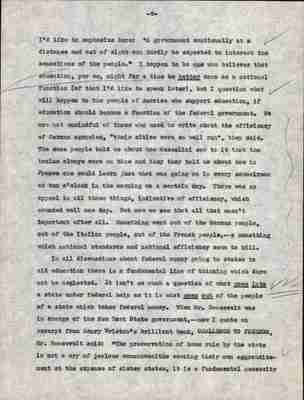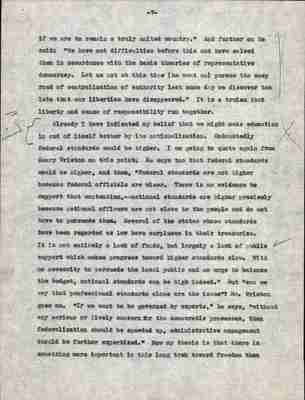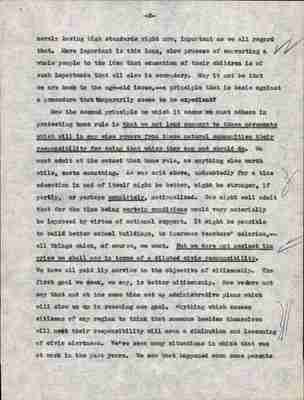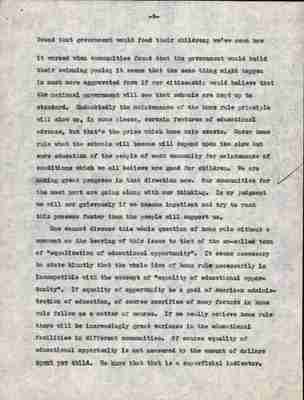Pages
6
-6-
I'd like to emphasize here: "A government continually at a distance and out of sight can hardly be expected to interest the sensations of the people." I happen to be one who believes that education, per se, might for a time be better done as a national function (of that I'd like to speak later), but I question what will happen to the people of America who support education, if education should become a function of the federal government. We are not unmindful of those who used to write about the efficiency of German agencies, "their cities were so well run", they said. The same people told us about how Mussolini saw to it that the trains always were on time and they they told us about how in France one could learn just what was going on in every schoolroom at ten o'clock in the morning on a certain day. There was an appeal in all those things, indicative of efficiency, which sounded well one day. But now we see that all that wasn't important after all. Something went out of the German people, out of the Italian people, out of the French people, -- a something which national standards and national efficiency seem to kill.
In all discussions about federal money going to states to aid education there is a fundamental line of thinking which dare not be neglected. It isn't so much a question of what goes into a state under federal help as it is what goes out of the people of a state which takes federal money. When Mr. Roosevelt was in charge of the New York State government, -- now I quote an excerpt from Henry Wriston's brilliant book, CHALLENGE TO FREEDOM, Mr. Roosevelt said: "The preservation of home rule by the state is not a cry of jealous commonwealths seeking their own aggrandizement at the expense of sister states, it is a fundamental necessity
7
-7-
If we are to remain a truly united country." And further on he said: "We have met difficulties before this and have solved them in accordance with the basic theories of representative democracy. Let us not at this time (he went on) pursue the easy road of centralization of authority lest some day we discover too late that our liberties have disappeared." It is a truism that liberty and sense of responsibility run together.
Already I have indicated my belief that we might make education in and of itself better by its nationalization. Undoubtedly federal standards could be higher. I am going to quote again from Henry Wriston on this point. He says too that federal standards would be higher, and then, "Federal standards are not higher because federal officials are wiser. There is no evidence to support that contention, -- national standards are higher precisely because national officers are not close to the people and do not have to persuade them. Several of the states whose standards have been regarded as low have surpluses in their treasuries. It is not entirely a lack of funds, but largely a lack of public support which makes progress toward higher standards slow. With no necessity to persuade the local public and no urge to balance the budget, national standards can be high indeed." But "can we say that professional standards alone are the issue"? Mr. Wriston goes on. "If we want to be governed by experts," he says, "without any serious or lively concern for the democratic processes, then federalization should be speeded up, administrative management should be further expertized." Now my thesis is that there is something more important in this long trek toward freedom than
8
-8-
merely having high standards right now, important as we all regard that. More important is this long, slow process of converting a whole people to the idea that education of their children is of such importance that all else is secondary. May it not be that we are back to the age-old issue, -- a principle that is basic against a procedure that temporarily seems to be expedient?
Now the second principle to which it seems we must adhere in protecting home rule is that we not lend support to those movements which will in any wise remove from these natural communities their responsibility for doing that which can and should do. We must admit at the outset that home rule, as anything else worth while, costs something. As was said above, undoubtedly for a time education in and of itself might be better, might be stronger, if partly, or perhaps completely, nationalized. One might well admit that for the time being certain conditions would very materially be improved by virtue of national support. It might be possible to build better school buildings, to increase teachers' salaries, -- all things which, of course, we want. But we dare not neglect the price we shall pay in terms of a diluted civic responsibility. We have all paid lip service to the objective of citizenship. The first goal we seek, we say, is better citizenship. Now we dare not say that and at the same time set up administrative plans which will slow us up in reaching our goal. Anything which causes citizens of any region to think that someone besides themselves will meet their responsibility will mean a diminution and lessening of civic alertness. We've seen many situations in which that was at work in the past years. We saw that happened when some parents
9
-9-
found that government would feed their children; we've seen how it worked when communities found that the government would build their swimming pools; it seems that the same thing might happen in much more aggravated form if our citizenship would believe that the national government will see that schools are kept up to standard. Undoubtedly the maintenance of the home rule principle will slow up, in some places, certain features of educational advance, but that's the price which home rule exacts. Under home rule what the schools will become will depend upon the slow but sure education of the people of each community for maintenance of conditions which we all believe are good for children. We are making great progress in that direction now. Our communities for the most part are going along with our thinking. In my judgment we will err grievously if we become inpatient and try to rush this process faster than the people will support us.
One cannot discuss this whole question of home rule without a comment on the bearing of this issue to that of the so-called term of "equalization of educational opportunity". It seems necessary to state bluntly that the whole idea of home rule necessarily is incompatible with the concept of "equality of educational opportunity". If equality of opportunity be a goal of American administration of education, of course sacrifice of many factors in home rule follow as a matter of course. If we really achieve home rule there will be increasingly great variance in the educational facilities in different communities. Of course equality of educational opportunity is not measured by the amount of dollars spent per child. We know that that is a superficial indicator.
10
-10-
True equality of educational opportunity would eventually mean a standard pattern in the training of the teachers, a standard pattern for the building of schoolhouses, or of the development of a curriculum. Those are the fundamental factors which clearly determine the so oft used phrase "equality of educational opportunity". It is interesting that the very ones who advocate measures which, on the surface, are for educational opportunity are the very loudest in denunciation of any measures which will strike at the true bases of equality in the educationl chance. Home rule would definitely mean abolition of the concept of equality of educational opportunity. If we want to talk about home rule, we should forget about that other phrase, for both of them cannot be sought at the same time. Home rule insists that each community, when the community is reasonably able, carry its own burden. As between communities, burdens cannot and would not be equalized. We, above all people, know that equalization is not the dominant goal of democratic society organized according to the American ideal. Encouragement of effort and recognition of fundamental differences is, however, inherent in our concept of what society should foster and make more possible.
As indicated above, one may quite logically, and perhaps rightly, subscribe either to home rule or to extended nationalization of education, but I doubt if one can logically talk about both in the same breath. To those who believe in extended nationalization of the educational program I'd like to say that it is not hard for me to see the logic in that line of reasoning. There are many reasons why there is concern of the people of one state when those from another state move in without having been taught to




